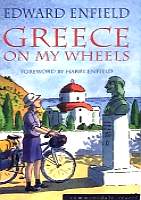Books and Good Reading
Title:
GREECE ON MY WHEELS. Author: Edward Enfield. In his travels Edward Enfield avoids, so far as is possible, the "tourist Greece" which it is clear he does not find attractive. Referring to the obligatory tourist sites he gives this wise advice. "When travelling in Greece, stay at the place you want to see. This makes it possible for you either to get up early and be there before the tourist buses arrive, or to go in the evening when they have gone". In place of the rather bland or over-hyped descriptions often found in travel books are acutely observed and amusingly, but never patronisingly, described encounters with local people and fellow travellers. Harry Enfield has the happy knack of being able to describe an event or scene amusing detail. You will meet the Greek shepherd who seems to command his flock like a military platoon; an American quantity surveyor; the Australian lady, Suzanna who runs the Phelops Hotel; Pate or Payt – the Australian cyclist who like to ride in the hate; and many others. His description of the King Otto Hotel in Nauplion is typical of his ability to conjure up both the appearance and the atmosphere of a place: rooms have ceilings about fifteen feet high, and it is extremely clean and always seems to have been freshly painted. In the right weather you should have breakfast in the garden, where they give you Madeira cake. The King Otto has more style than any hotel I know, and in common with allGreek hotels, has no fear of fire but thinks something terrible may happen to you in the bathroom………… Greek hotels equip the bathroom with mysterious strings which I have often pulled in the hope that they might make the light come on or the water get hot, and then realised I have sounded the alarm. Nothing ever happens, though, so it doesn’t matter. I think these alarms must be required as a matter of law but are never attended to, as a matter of Practice. There is a very timely description of Olympia and some interesting comments, written in 1873 by J.P. Mahaffy, an Irish classical scholar. He had a rather low opinion of the sportsmanship of the athletes taking part in the original games! The second also, from Eothen, recounts ‘A Conversation through a Dragoman’ between a British traveller and a Pasha. Amusing and reminiscent of "Yes Minister". The third concerns Byron and Mesolongi. It was a joy to read this book and I would thoroughly recommend it to any who loves Greece, or to anyone who is contemplating visiting for the first time. Reviewer |
